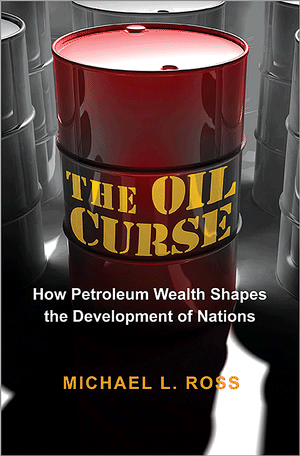The Oil Curse: How Petroleum Wealth Shapes the Development of Nations (Princeton University Press, 2012)
Russian / русский: Gaidar Institute, Excerpt / образец
Portuguese / português: Citadel Groupo Editorial, Amazon Brasil
Japanese / (日本語): Yoshida Shoten Publishing>
Arabic / العربية: Forum of Arab and International Relations / منتدى العلاقات العربية والدولية
Countries that are rich in petroleum have less democracy, less economic stability, and more frequent civil wars than countries without oil. What explains this oil curse? And can it be fixed? In this groundbreaking analysis, Michael L. Ross looks at how developing nations are shaped by their mineral wealth--and how they can turn oil from a curse into a blessing.
Ross traces the oil curse to the upheaval of the 1970s, when oil prices soared and governments across the developing world seized control of their countries' oil industries. Before nationalization, the oil-rich countries looked much like the rest of the world; today, they are 50 percent more likely to be ruled by autocrats--and twice as likely to descend into civil war--as countries without oil.
The Oil Curse shows why oil wealth typically creates less economic growth than it should; why it produces jobs for men but not women; and why it creates more problems in poor states than in rich ones. It also warns that the global thirst for petroleum is causing companies to drill in increasingly poor nations, which could further spread the oil curse.
Endorsements:
"This is a masterful book. It provides a balanced and thoughtful overview of the wide variety of issues surrounding the politics of oil while also breaking new ground in research. The Oil Curse is essential reading for scholars and those engaged in public debates. An important contribution."--Robert Bates, Harvard University
"This is the single most important book on the resource curse to date. The Oil Curse addresses a timely, policy-relevant issue in a way that nonacademics and academic specialists alike can appreciate. Ross is the preeminent voice on the subject."--Erik Wibbels, Duke University
"The Oil Curse is the best and most thorough examination that we have of the causes and consequences of oil wealth for poorly governed states. Oil revenues are massive, opaque, and volatile; they destroy the relationship between a state and its own citizens. Ross substantiates some of the common assertions about oil wealth, finds that others are incorrect, and offers some surprising discoveries. Very worth reading."--Stephen D. Krasner, Stanford University
"This important book brings new and timely insight into a key global phenomenon. High oil prices have triggered oil strikes concentrated in the poorest countries--the bottom billion. Will this time be different? Will oil drive transformation or cause a repeat of the history of plunder? Ross presents new research in an accessible style. Read it: understanding is the foundation for change."--Paul Collier, author of The Bottom Billion
Reviews:
"Economists have mostly shied away from full costings of the ecological and social devastation of oil use. Were they to do so with thoroughness and authority displayed by Ross in The Oil Curse, they might start to develop the new economic model for oil and other extractive industries that is so desperately needed."--John Vidal, Nature
"[P]articularly timely...Ross has an easy style and his central points are made clearly."--Ed Crooks, Financial Times.
"[S]tunning . . ."--Johnny West, Huffington Post UK
"[A]n excellent book . . ."--Tyler Cowen, Marginal Revolution
"The Oil Curse leads us into the hidden world of the oil business. It presents some surprising discoveries and provides important information in a very accessible way. It is the most up-to-date book on a timely and important topic."--Lisa Kaaki, Arab News
"Ross [is] to be applauded for advancing the conversation beyond revel[l]ing in the history of human extraction of resources to expressing sorrow for the negative impacts of mineral rushes, which most social science books in this genre tend to follow. . . . Cautionary narratives such as th[is] . . . are important for engineers and chemists to read to further hasten the search for solutions to resource scarcity dilemmas."--Saleem H. Ali, Chemical & Engineering News
